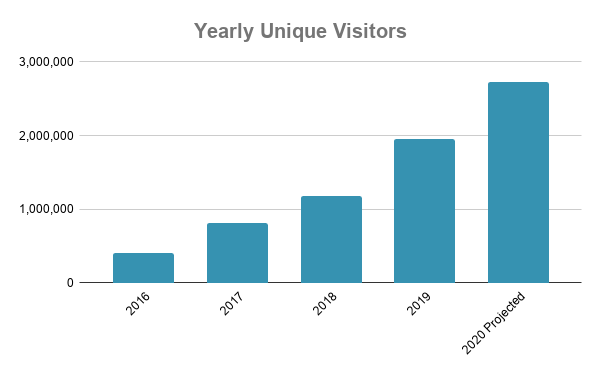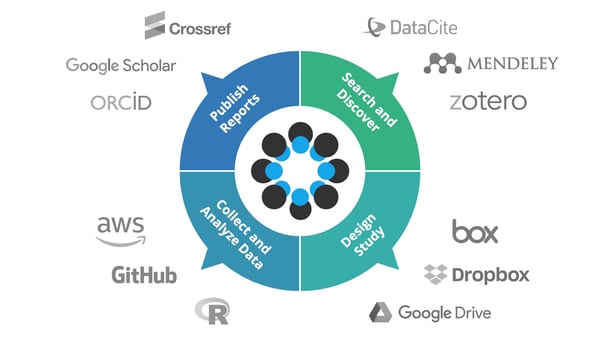
We launched the Open Science Framework (OSF) in 2012 as infrastructure to support our mission to change the research culture toward openness, integrity, and reproducibility. With OSF, our goal is to make rigor and transparency enhancing behaviors possible, easy, and efficient to ease onboarding of researchers who are responding to shifting cultural norms, incentives, and policies promoting open research. Like many other service providers in the open research community, we have been amazed at the enthusiasm and pace of the community adopting open research. For example, our user base has grown non-linearly every year and recently hit 250,000 registered users..png?width=600&name=OSF%20User%20Base%20Growth%20(1).png)
The accelerating growth is a basis for celebrating progress on our mission, while also addressing the challenges to sustain the services that have become so popular, so quickly. OSF is open source and free to users because our mission is to advance transparency and inclusivity in the research process. Academic research is a public good and we are committed to minimizing barriers to access for research consumers to read and use content hosted on OSF and for research producers to collaborate, archive, and share using the OSF. We must find sustainable solutions for the infrastructure that do not sacrifice on that commitment.
Our most urgent sustainability challenge is that research producers are excelling at archiving and sharing their research data, materials, protocols, outcomes, and code, and an accelerating number of research consumers are accessing and downloading that content for their own work. The number of files stored on OSF privately or publicly is growing at non-linear rates, as are the number of visitors and content downloads.

This is amazing, wonderful, and costly. Google provides hosting services for OSF, and the bill for storage and hosting has been increasing an average of 5% per month, every month. At this rate, within a few years, the entire budget for the Center for Open Science would be going to Google.
COS’s sustainability model begins with its $250,000 preservation fund, which ensures data hosted on OSF will remain should COS ever close its doors. We also actively collaborate with groups such as Internet Archive to distribute and steward long-term access to open research data by implementing sustainable infrastructure for libraries, open repositories, and other data curators.
In 2018, COS expanded its sustainability model to offer fee-for-service interfaces for stakeholder groups to advance open research in their communities. These interfaces support preprints, collections, registries, and institutions. These interfaces are a mission-aligned business model because they promote open research norms and behaviors in the communities operating them, and we can stay true to the commitment that posting and consuming OSF content remains free to users.
However, the fee-for-service interfaces are not enough to cover the exponential growth in our Google bill. We need more direct solutions to address that cost. A long-term strategy is to connect OSF with as many repositories as possible—institutional and otherwise—so that storage and hosting costs can be distributed among stakeholders. Many institutions are eager to have their researchers making better use of their repository services and OSF can help facilitate that (see OSF Institutions).
But, we also need a near-term strategy to curb the accelerating growth. And, for that reason, our first step will be to implement storage caps per project. Offering free, unlimited storage has been a great perk of OSF, but now we’re asking for the community’s assistance—as stakeholders in the success and sustainability of OSF—to help manage storage by utilizing the storage provider add-on integrations in their OSF projects.

Starting November 3, 2020, OSF will limit the storage capacity for private projects to 5 GB of OSF Storage, and 50 GB for public projects. Please take a moment to learn more and review what these storage changes may mean for you, your collaborators, and your existing storage workflows.
We anticipate the storage changes will have a negligible effect on most users and projects. Currently, less than 3% of private projects exceed the 5 GB capacity; yet, projects that exceed the 5 GB limit collectively contribute to more than 150 TB of data on the OSF. The upcoming storage changes will guide future projects toward more sustainable practices.
Through shared investment in OSF’s sustainability we can ensure producers of research will always have a place to share their data, materials, and preprints and improve the rigor of their research through preregistration. We can further assure that consumers of research will find inclusive research outputs accessible to them, independent of location and financial means. The need for openly shared data to accelerate cures and innovation is vital to the global research community.
Take the next steps toward OSF’s sustainability by integrating OSF storage add-ons with your projects today. We also encourage you to join our community webinar October 7 to learn more about the storage options available to you or your institution.
OSF is free to use, but it’s not free to build or maintain. If you have benefitted from OSF, please consider making a personal one-time or recurring donation.

210 Ridge McIntire Road
Suite 500
Charlottesville, VA 22903-5083
Email: contact@cos.io

Unless otherwise noted, this site is licensed under a Creative Commons Attribution 4.0 International (CC BY 4.0) License.
Responsible stewards of your support
COS has earned top recognition from Charity Navigator and Candid (formerly GuideStar) for our financial transparency and accountability to our mission. COS and the OSF were also awarded SOC2 accreditation in 2023 after an independent assessment of our security and procedures by the American Institute of CPAs (AICPA).
We invite all of our sponsors, partners, and members of the community to learn more about how our organization operates, our impact, our financial performance, and our nonprofit status.